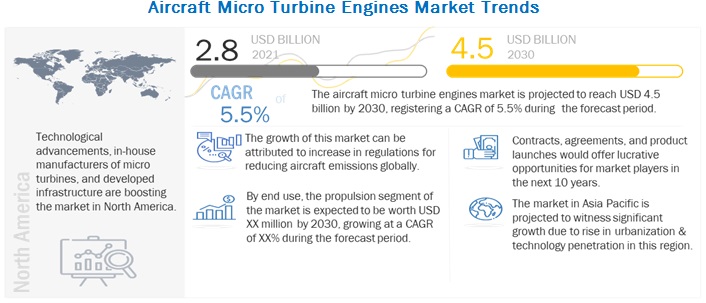According to a research report “Aircraft Micro Turbine Engines Market by End Use (OEM, Aftermarket), Platform (General Aviation, Commercial Aviation, Military Aviation, Advanced Air Mobility), Horsepower, Engine Type, Fuel Type and Region – Forecast to 2030″ published by MarketsandMarkets, the Aircraft Micro Turbine Engines Market is estimated at USD 2.8 billion in 2021 and is projected to reach USD 4.5 billion by 2030, at a CAGR of 5.5% from 2021 to 2030.
• Informational PDF Brochure :- https://www.marketsandmarkets.com/pdfdownloadNew.asp?id=248924999
Browse 127 market data Tables and 46 Figures spread through 182 Pages and in-depth TOC on “Aircraft Micro Turbine Engines Market and Region – Forecast to 2030″View detailed Table of Content here – https://www.marketsandmarkets.com/Market-Reports/aircraft-micro-turbine-engines-market-248924999.html

The market exhibits lucrative growth potential during the forecast period primarily due to the inherent operational benefits of micro turbine engines, including low operating and maintenance costs of micro turbine engines and the introduction of new generation hybrid architecture in aircraft. Nevertheless, the emergence of hybrid electric power generation technology and the development of distributed power generation systems are anticipated to open several growth opportunities for aircraft micro turbine engine manufacturers during the forecast period.
The outbreak of COVID-19 has moderately impacted the aircraft micro turbine engines market and the effects have been mostly limited to delays in order deliveries because of large-scale disruptions in the supply chain in affected countries. However, new supply chain technologies are emerging, significantly improving visibility across the end-to-end supply chain, and supporting more supply chain agility and resiliency without the traditional overhead associated with risk management techniques.
Based on installation, the aftermarket segment of the aircraft micro turbine engines market is estimated to account for the largest market share in 2021
Based on installation, the aftermarket segment is expected to dominate the market share in 2021. However, the segment is overshadowed by the Original Equipment Manufacturer (OEM) segment during the later half of the forecast period (2024 to 2030). The aftermarket segment of the aircraft micro turbine engines market is limited to the replacement of auxiliary power units (APUs) once its service life expires. Since the aftermarket segment mainly replaces micro turbines on old aircraft, the research excludes platforms such as light aircraft, military UAVs, and advanced air mobility (cargo drones and air taxis). Micro turbine engine manufacturers are the sole source of APU replacement. The aftermarket for micro turbine engines of light aircraft, military UAVs, and advanced air mobility aircraft is futuristic as many of these products are yet to be commercialized. However, the continuous advancements in micro turbine engine technology are expected to drive the growth of the aftermarket segment.
Based on end-use, the auxiliary power segment is estimated to account for the largest market share from 2021 to 2030
Based on end-use, the auxiliary power segment is expected to dominate the market share during the forecast period (2021 to 2030). There are ongoing research activities undertaken on an aircraft architecture wherein a micro turbine engine is used for auxiliary power. Micro turbine engines with power ratings between 5 HP and 500 HP are expected to find applications as auxiliary power units in civil aviation by cutting off the operating costs of light aircraft and business jets. The use of microturbines for auxiliary power would increase onboard electric power generation and reduce emissions. The anatomy of a microturbine is similar to a gas turbine used in an aircraft comprising compressor, combustor, turbine, alternator, recuperator, and generator. For small-scale power generation, microturbines for propulsion in aircraft offer many advantages over other technologies, including lesser moving parts, compatible size, lighter weight, better efficiency, lower emissions, and waste fuel utilization. These systems also allow recovery of waste heat, leading to efficiencies greater than 80%.
Based on platform, the advanced air mobility segment is estimated to exhibit the fastest growth in the aircraft micro turbine engines market from 2021 to 2030
Based on platform, the advanced air mobility segment is expected to witness the fastest growth during the forecast period (2021 to 2030). The unprecedented growth in urban population is envisioned to promote the development of hybrid air taxis and unmanned cargo delivery systems. Presently, several companies are focusing on the development of air taxis that are expected to be commercialized in the coming years. Air taxis can be piloted manually or flown autonomously and have the capability to take off and land vertically, making it easier for them to land in crowded locations in cities. For instance, Rolls- Royce (US) announced the development of a comprehensive hybrid aerospace turbine engine that is expected to pave the way for experimental flights on aircraft after 2021. The development includes a prototype of the APUS i-5 aircraft to demonstrate the commercial applications of hybrid-electric technology. The system could be used across a wide range of transport platforms, including VTOLs, to enable distributed electric propulsion in aircraft.
Moreover, hybrid architecture is being preferred for power powering intercity travel and cargo deliveries. With the establishment of a viable Beyond Visual Line of Operations (BVLOS) regulatory framework, the adoption of drones for point-to-point delivery of cargo and passengers is envisioned to increase. Japan is one of the few countries to have tested large UAVs for use in freight transport. Swiss Post and Swiss WorldCargo (Switzerland) are currently experimenting with drones for air freight solutions. Plans for commercial drones for freight have recently been announced by many companies, including Deutsche Post (DHL)(Germany), Zookal, Inc. (an Australian textbook service), and Amazon, Inc (US).
The European market is projected to contribute the largest share in 2021 in the aircraft micro turbine engines market
Based on region, Europe is expected to lead the aircraft micro turbine engines market in 2021. The demand for stealth and durable aerial vehicles for use in military operations in Europe is expected to rise soon. Key players operating in the European market are entering into agreements and collaborations to develop technologies and platforms that can expand the applicability of aerial vehicles in border and coastal patrolling and homeland security. The UK government has permitted more than 130 private companies to fly UAVs in civilian airspace, while France has approved limited UAV operations for homeland security activities. The demand for compact and efficient propulsion systems to operate military drones will drive the aircraft micro turbine engines market. The rise in the number of development programs for electric aircraft, the development of aerial vehicles with advanced technologies, and the growth in air traffic are the major factors expected to add up to the growth of the market in this region during the forecast period.
Major companies profiled in the report include Raytheon Technologies Corporation (US), Honeywell International Inc. (US), Kratos Defense & Security Solutions Inc. (US), Safran SA (France), and UAV Turbines Inc. (US), among others.
About MarketsandMarkets™
MarketsandMarkets™ provides quantified B2B research on 30,000 high growth niche opportunities/threats which will impact 70% to 80% of worldwide companies’ revenues. Currently servicing 7500 customers worldwide including 80% of global Fortune 1000 companies as clients. Almost 75,000 top officers across eight industries worldwide approach MarketsandMarkets™ for their painpoints around revenues decisions.
Our 850 fulltime analyst and SMEs at MarketsandMarkets™ are tracking global high growth markets following the “Growth Engagement Model – GEM”. The GEM aims at proactive collaboration with the clients to identify new opportunities, identify most important customers, write “Attack, avoid and defend” strategies, identify sources of incremental revenues for both the company and its competitors. MarketsandMarkets™ now coming up with 1,500 MicroQuadrants (Positioning top players across leaders, emerging companies, innovators, strategic players) annually in high growth emerging segments. MarketsandMarkets™ is determined to benefit more than 10,000 companies this year for their revenue planning and help them take their innovations/disruptions early to the market by providing them research ahead of the curve.
MarketsandMarkets’s flagship competitive intelligence and market research platform, “Knowledgestore” connects over 200,000 markets and entire value chains for deeper understanding of the unmet insights along with market sizing and forecasts of niche markets.
Media Contact
Company Name: Marketsandmarkets pvt ltd
Contact Person: Mr. Aashish Mehra
Email: Send Email
Phone: 18886006441
Address:630 Dundee Road Suite 430
City: Northbrook
State: IL 60062
Country: India
Website: https://www.marketsandmarkets.com/Market-Reports/aircraft-micro-turbine-engines-market-248924999.html

